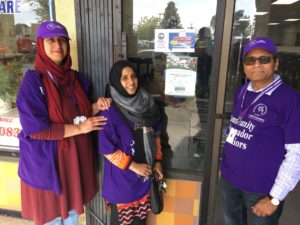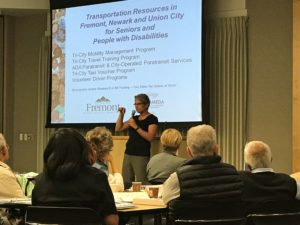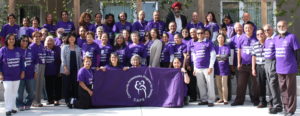Project at a Glance
- Issue Area Health equity, Immigrant integration, Racial equity and healing, Social services
- Engagement Approaches Community conversations/dialogues, Community meetings (townhalls, forums, etc), Embedding a culture of engagement, Engaging non-English speakers, Neighborhood events/ activities, Partnering with residents, Trust building, Visioning/ strategic planning
This content is available to members only. Members, please log in below to view! Not a member? Join us now to unlock this and other exceptional content.
Community Ambassador Program for Seniors (CAPS)
Rationale:
In 2004, Fremont received a grant to improve the quality of life for seniors in the area. The City particularly wanted to ensure that they were engaging and serving the City’s large immigrant population, particularly those who were not native English speakers or may have had trouble navigating and accessing the government services available.
Goals:
The first goal for the Community Ambassador Program was to connect immigrant seniors with a person they could trust to ask questions about accessing services—a place to turn that feels familiar, open, and safe. The ultimate goal of the program is to better serve immigrant seniors and better connect them to the City’s resources and services.
Project Summary:
After receiving the grant, Fremont partnered with local community organizations to engage their many diverse residents in focus groups. To ensure they were reaching members of the community, the City reached out to community leaders, particularly leaders at churches, temples, mosques, and gurdwaras.

Fourteen focus groups were held in nine different languages in which they asked seniors what they needed to improve their quality of life. Next, the City held two larger community dialogues with approximately 200-300 people each, posing similar questions to seniors about access to services, navigating government systems, and healthcare. What came out of these dialogues were primarily concerns about residents who were non-native English speakers. Residents wanted to ensure that non-native English speakers could better access the services available to them, could feel comfortable navigating complex government systems, and had assistance with processes like applying for citizenship and Social Security. From the information gathered at these focus groups and dialogues, the City developed a Strategic Plan and an Action Plan to address these needs.
Soon after, the City received two more grants to implement their plans. Their primary goal was to form a program that could reach individuals where they were—taking information to them wherever they socialize or congregate rather than requiring individuals to reach out to the City. From these grants and the City’s Strategic Plan and Action Plan, Fremont’s Community Ambassador Program for Seniors (CAPS) was created.
The CAPS program recruits and trains volunteers from the community to learn about city  programs and options that are available to seniors. The volunteers (called ambassadors) take classes with other community members from a variety of cultures and learn how to access services like medical care, public transit, and affordable housing, as well as where to go with immigration questions. Ambassadors then return to their communities and serve as liaisons between residents and those services. Ambassadors hold events in their communities to reach out to seniors and receive ongoing supervision and monthly training based on their interests. For difficult cases, ambassadors are trained to refer residents to the Senior Help Line to be connected with case managers.
programs and options that are available to seniors. The volunteers (called ambassadors) take classes with other community members from a variety of cultures and learn how to access services like medical care, public transit, and affordable housing, as well as where to go with immigration questions. Ambassadors then return to their communities and serve as liaisons between residents and those services. Ambassadors hold events in their communities to reach out to seniors and receive ongoing supervision and monthly training based on their interests. For difficult cases, ambassadors are trained to refer residents to the Senior Help Line to be connected with case managers.
The program’s trainings were developed with help from Stanford and San Jose State professors. Experts and managers from various community organizations and city agencies also speak at the trainings to connect directly with participants.
Engagement Strategies:
The City’s primary engagement strategy was to utilize partnerships they already had with neighborhood and community leaders. These neighborhood leaders reached out to residents directly in places where they normally spend time, particularly religious congregations. By doing this, the City was able to reach residents where they were rather than attempting to draw residents into potentially unfamiliar terrain.
The focus groups, community dialogues, and written materials were all offered in multiple languages, with the focus groups being held in eight different languages. To recruit volunteers, the City again utilized their relationships with local leaders. Program Director Asha Chandra stated:
“What’s great about the program is that I’ve never had a problem getting volunteers because those leaders have relationships with their own community. They are able to reach out in ways that we would never be able to.”
Outcomes:
 Since the initiation of the program, the City has trained about 250 volunteers total, all 50 years of age or older. They hold a training for new volunteers every 18 months, and each year they train approximately 75-100 volunteers. In 2018 alone, 80 ambassadors have collectively contributed 3,025+ volunteer hours and served 825+ older adults. The CAPS curriculum has been purchased by three cities that wish to replicate the model.
Since the initiation of the program, the City has trained about 250 volunteers total, all 50 years of age or older. They hold a training for new volunteers every 18 months, and each year they train approximately 75-100 volunteers. In 2018 alone, 80 ambassadors have collectively contributed 3,025+ volunteer hours and served 825+ older adults. The CAPS curriculum has been purchased by three cities that wish to replicate the model.
While the program started specifically as a way to connect with immigrant seniors, it has expanded to include ALL seniors. The City has training groups that represent all of the city’s demographics, including Caucasian, Black, Hispanic, Indian, Chinese, Filipino and others.
Additional Resources:
Fremont’s Community Ambassador Program for Seniors website
Local Contact:
Marisha Engineer, MSW
City of Fremont-Human Services Dept
510.574.2050
[email protected]
Explore More Innovations From Communities Across the Country and Down the Road
See All ProjectsThank You to Our Key Partners




